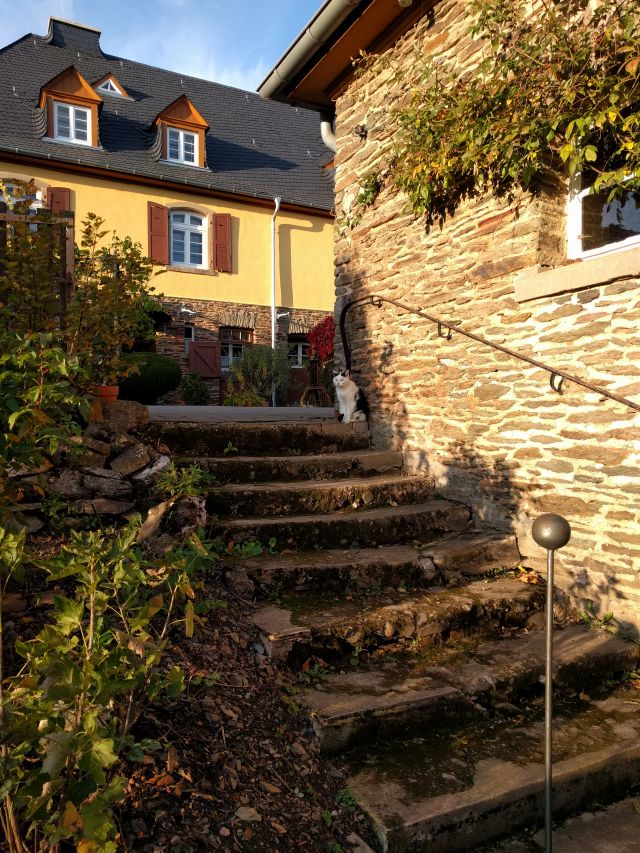MOSEL ADVENTURES
by Alex manning
I spontaneously quit a job and left a great city in order to travel for a few months. My life felt like one long dilemma, but this was one decision that felt right. I planned hastily, and packed light. It worked out well.
My travels started nicely, with some slow days in Cologne wandering through Gerhard Richter exhibits and sitting at Kölsch breweries writing emails. I received timely and friendly responses from the requests I had sent to winemakers in the Mosel Valley, and soon enough I was working on the steep slopes of the Marienburg for Clemens Busch. After a half a week’s work, I left with a new appreciation for his big, bold rieslings, his commitment to biodynamic winemaking, a newfound fear of falling from high, unstable rocky slopes, and many blisters on my palms. Needless to say, it was a rude awakening to my ‘vacation’ in the Mosel.
A week working within the vines at Weingut Selbach-Oster passed quickly, where the tasks were more forgiving and Johannes and Barbara Selbach were classically German by being so helpful, gracious and welcoming. I needed some excitement, and found exactly that when I met Ulrich ‘Ulli’ Stein, a doctor of chemistry and outspoken critic of the politics surrounding German wine, at his house on the hill. It’s essentially a castle on a bluff, overlooking the river in both directions, with vineyards flowing down the slopes on every side. Haus Walfrieden is possibly the most beautiful place I’ve visited in Germany. We stayed up late drinking unique bottles of wine while I listened to Ulli talk about politics, his reclamation of old, forgotten vineyards along the Mosel, his cultural program at Haus Walfrieden, and Mosel history. The highlights: Germans are still skeptical of the American political system, the history of winemaking in Mosel is ancient, complicated, and culturally as important as Bordeaux, Burgundy, Barolo or La Rioja and, for some reason, Ulli aged a spätlese in an oak barrique and it’s awesome. Drink Stein wine!
The next day, in that gracious considerate way, I was driven by Ulli to my next host, Gernot Kollman of Weingut Immich-Batterieberg. I was able to help prepare a few shipments, label some bottles, and assist during a major production day when we filled many thousands of bottles of C.A.I., his basic Riesling. But, mostly, Gernot and I sat with his other winemaker friends and again discussed politics, wine, and local history. Gernot comes from an industrial region in the north of Germany, and unlike most winemakers in this region, doesn’t come from a winemaking family, and didn’t inherit any vineyards. He has built an amazing winery, and a reputation as a host. Daniel Vollenweider, who has a similar background but hails from Switzerland, makes wine on neighboring vineyards in the middle Mosel near Traben-Trarbach.
Daniel and Gernot meet regularly, depending on the season, and pull unique wines from their cellars to pair with cheeses or specialties from around Europe. Both make regular trips to other regions to purchase or exchange bottles with winemaker friends, and have been collecting for years. They don’t usually open Rieslings together, and almost never drink their own wine. I was introduced to odd wines from Northern Italy, small producers in France, a bottle of ‘61 Rioja, and an Auslese from one of Vollenweider’s first vintages in the Mosel.
He wanted Gernot’s opinion on the wine, and said it was one he hadn’t visited in years. They agreed it was possibly ready for auction, but could also use another few years. I had no constructive input, and simply said that it was delicious, and thank you. Being in the presence of so many talented wine makers had finally taught me some humility.
Gernot had a meeting in the tiny wine town of Trier, where the tributaries of the Saar und Ruwer flow into the Mosel. I hitched a ride with Gernot, and had lunch with him and the former wine importer, now writer and winemaker-to-be Lars Carlberg. Lars is an expat from Austin, Texas who has lived in Trier for the last decade, writing about and researching Riesling. A few days later I would go stay with Lars, and we would drink some riesling together. He helped me orchestrate visits to Maximin Grünhaus, Karthaüserhof, Zilliken, Peter Lauer, Hofgut Falkenstein and others. I tasted more amazing wine because of him and will be forever in his debt.
With some yearlong encouragement from my friends here in Germany, I am back in the vineyards of the Mosel for the ‘16 harvest, and it looks to be a great vintage so far. You can find me here, speaking German with a bad accent, tasting all the wine, working here and there, and trying to find a visa or a German wife. I don't plan on leaving anytime soon. Visitors are welcome.




